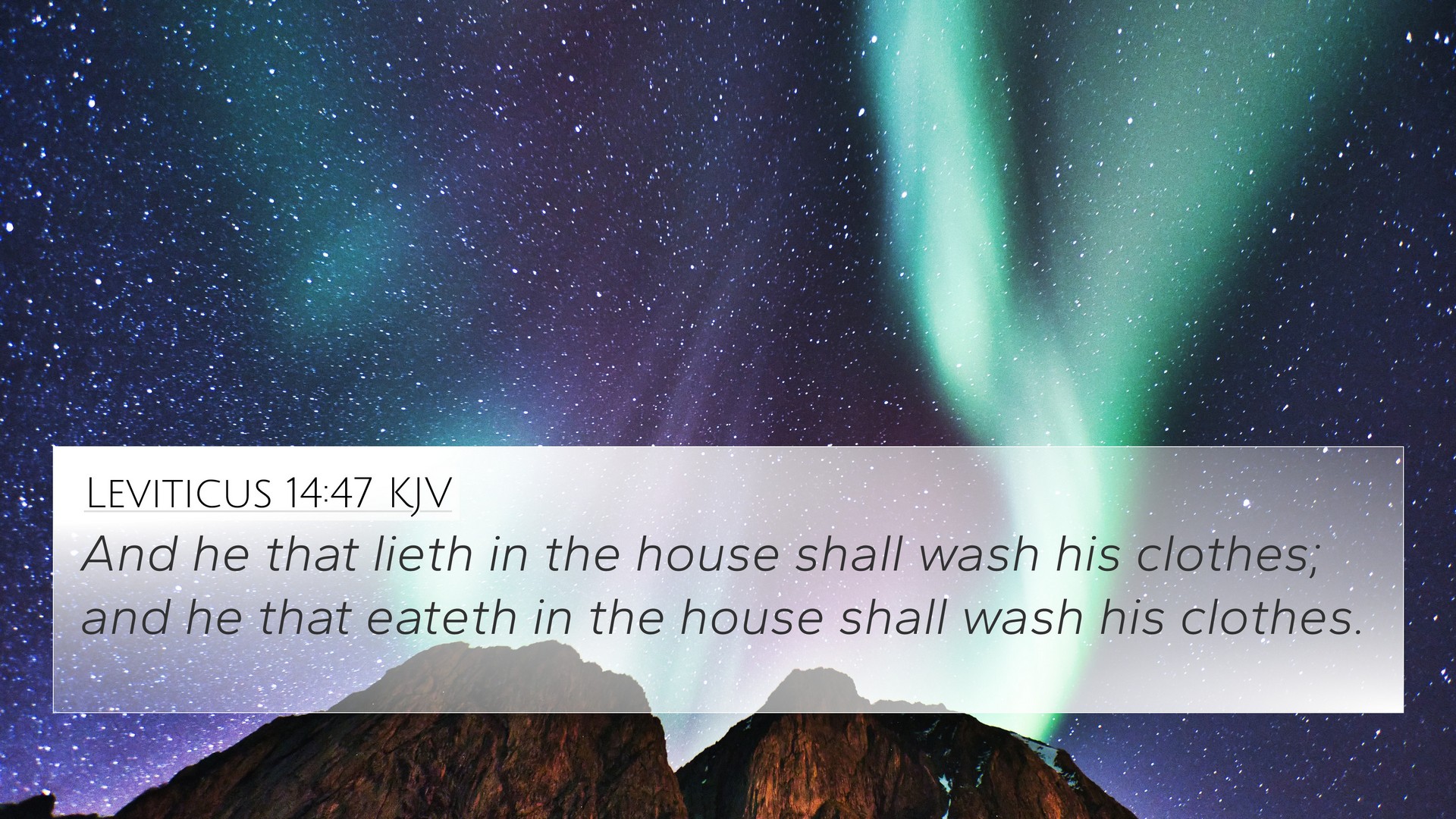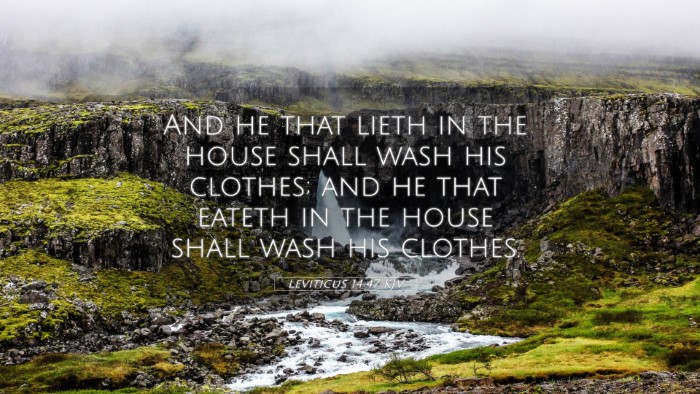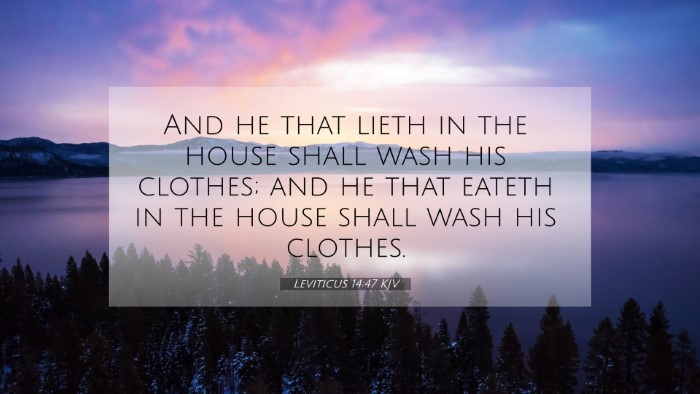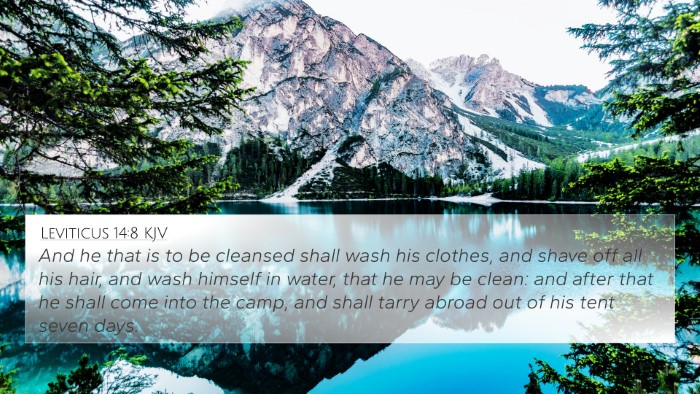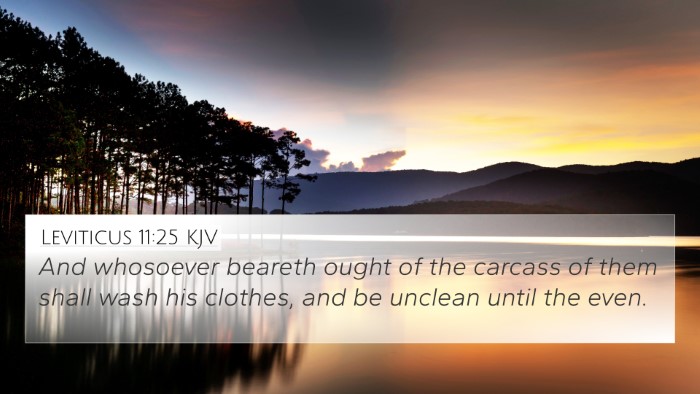Understanding Leviticus 14:47
Verse: Leviticus 14:47 - "And he that lieth in the house shall wash his clothes; and he that eateth in the house shall wash his clothes."
Summary of Meaning
Leviticus 14:47 deals with the regulations concerning a house affected by leprosy. In this verse, specific actions are prescribed for those who come into contact with a house that has been declared unclean due to this disease. The emphasis is on cleanliness and the importance of ceremonial purity in the Israelite community.
Commentary Insights
The following insights are derived from the public domain commentaries of Matthew Henry, Albert Barnes, and Adam Clarke:
-
Matthew Henry:
Henry notes the seriousness of leprosy as a symbol of sin and its spread. The instructions here reveal God's concern for both physical and spiritual cleanliness. The act of washing clothes signifies the removal of defilement, stressing that one must be diligent about maintaining purity within their dwelling.
-
Albert Barnes:
Barnes highlights that the washing of clothes serves as a reminder of the sanctity of both personal and communal spaces. By washing their garments, individuals acknowledge the presence of impurity and actively participate in the process of restoration and purity prescribed by the Law.
-
Adam Clarke:
Clarke emphasizes that this injunction shows a practical aspect of the law where individuals take responsibility for their own purity. It is a vivid representation of the broader theme of holiness that permeates the Israelites’ relationship with God.
Bible Verse Cross-References
Leviticus 14:47 can be cross-referenced with several other scriptures that deal with cleanliness, purity, and the laws concerning leprosy:
- Leviticus 13:45-46 - Details the treatment of individuals diagnosed with leprosy, emphasizing the necessity of isolation.
- Numbers 19:20 - Discusses the consequences of failing to comply with purification rituals.
- Hebrews 9:13-14 - Connects Old Testament purification laws with the New Testament doctrine of cleansing through Christ's sacrifice.
- Matthew 8:2-4 - Relates to Christ healing a leper and His command to show oneself to the priest, fulfilling the law.
- Isaiah 1:16-18 - God calls His people to wash themselves, inviting them to be cleansed from sin.
- 2 Corinthians 7:1 - Paul encourages believers to cleanse themselves from all defilement, paralleling the call in Leviticus.
- 1 John 1:9 - Highlights the importance of confession and divine cleansing, offering a New Testament perspective on purity.
Thematic Connections
This verse illustrates a central theme in Scripture concerning the necessity of cleanliness, both physical and spiritual. The regulations in Leviticus remind believers of the importance of being set apart for God and the implications of sin in communal life.
Further Reflections
Cleanliness in the Bible is not merely about hygiene; it draws deep connections between moral and ceremonial purity. Engaging in practices of cleanliness reinforces the believer's commitment to living in accordance with God's standards.
Application in Today’s Context
For modern readers, Leviticus 14:47 serves as an admonition to maintain purity in every aspect of life—reflecting not only on external actions but also on internal purity of heart. It calls for self-examination and diligence in avoiding moral and spiritual contamination.
Conclusion
In exploring the insights of Leviticus 14:47 through commentary analysis and cross-referencing, we understand its lasting implications for both the ancient Israelites and contemporary believers. This foundational aspect of holiness continues to resonate, emphasizing the overarching biblical call to be clean and set apart for God.
Keywords Integration
This analysis utilizes several keywords for effective biblical study resources:
- Bible verse cross-references
- Connections between Bible verses
- Linking Bible scriptures
- Comparative Bible verse analysis
- Bible verses that relate to each other
- Cross-referencing Biblical texts
- Thematic Bible verse connections
- Bible verse parallels
